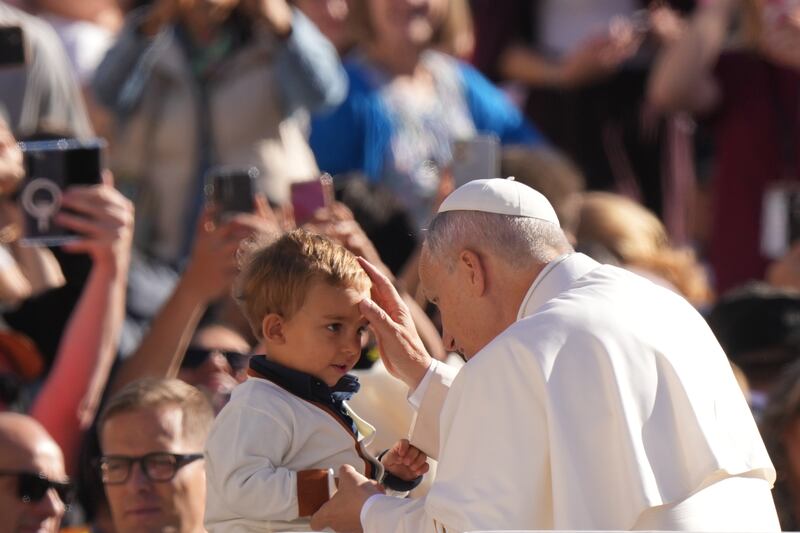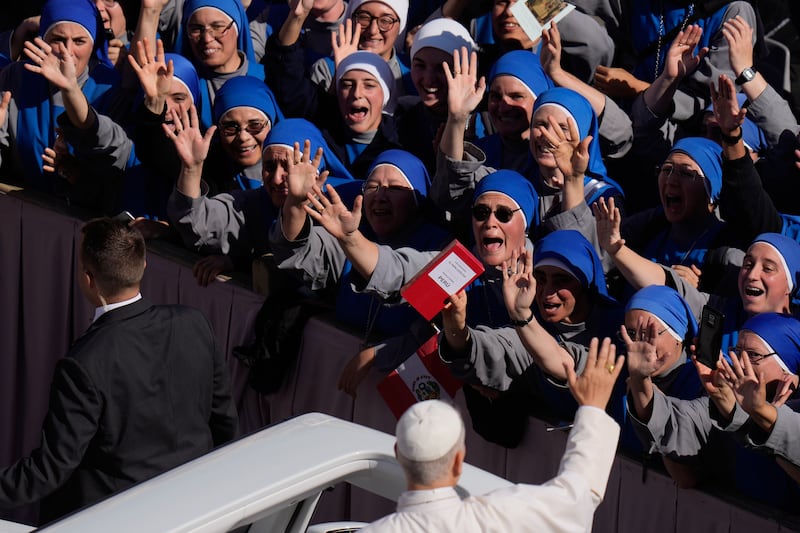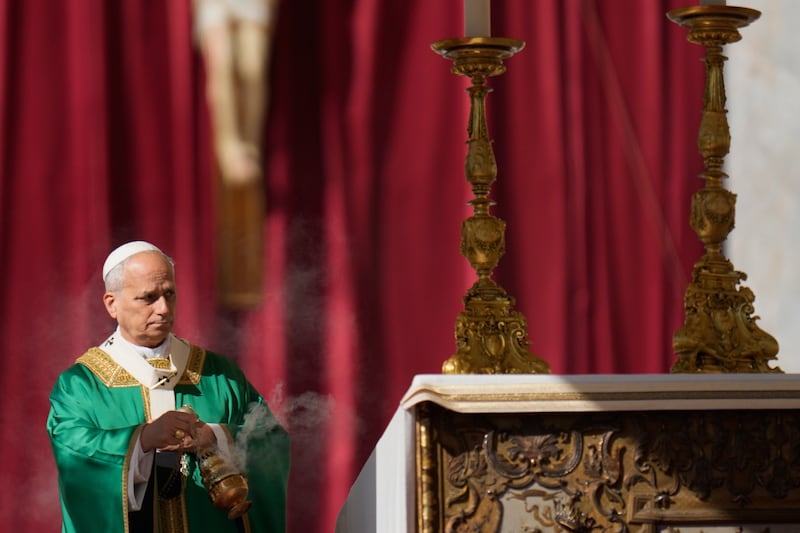In the first major teaching of his papacy, Pope Leo XIV turned his attention to the poor, calling on Christians worldwide to defend those who are “lowly and powerless.” A 40-page document known as an apostolic exhortation is addressed to all Christians and was released by the Vatican on Thursday.
“We need to be increasingly committed to resolving the structural causes of poverty,” Leo wrote in the document titled “I Have Loved You”(“Dilexi te”).
Pope Leo explains that poverty is not only a lack of material goods, but it also impacts those who are socially marginalized and lack freedoms, rights and social recognition.
Among the poor, he notes, are prisoners, victims of sexual exploitation, those impacted by “environmental deterioration,” as well as migrants and refugees.
“Christian holiness often flourishes in the most forgotten and wounded places of humanity,” Leo wrote. “The poorest of the poor — those who lack not only material goods but also a voice and the recognition of their dignity — have a special place in God’s heart.”
He emphasized that respecting everyone’s dignity is a Christian’s moral imperative “and the extreme poverty of all those to whom this dignity is denied should constantly weigh upon our consciences.”
An apostolic exhortation, while less formal than an encyclical, is considered a significant teaching document, aimed at guiding both the church and the wider world in living out their faith.
Continuity in teaching

Leo frames the document as an extension of Pope Francis’ work, highlighting the church’s enduring mission to serve those in need.
The document was signed Oct. 4, the feast of St. Francis of Assisi, and builds on the writings that Leo’s predecessor Pope Francis had started. “I am happy to make this document my own,” Leo wrote.
While the question of the poor is viewed as a social problem, at its core it’s a theological one from the Catholic perspective. “It’s how God revealed himself as a newborn child,” said Massimo Faggioli, historian of the Catholic Church and professor at Loyola Institute at Trinity College Dublin, who studies Catholic thought.
Pope Leo, the first American pope and someone who had traveled across the world as the former head of the Order of Saint Augustine, is well-positioned to reintroduce these teachings, Faggioli noted.
“Pope Leo cannot be accused of not knowing the world of poverty,” he said. “He has the view of the situation that’s hard to delegitimize.”
The document is divided into five chapters and draws on scripture, Catholic tradition and the papal teachings of Leo’s predecessors. Passages include titles like “the choice of the poor,” “care of the sick,” “freeing prisoners” and “accompanying minors.”
Four actions

Although the document is not explicitly political, it speaks to the current moment, Faggioli said. It follows Pope Leo’s recent calls for inclusion of immigrants.
In addressing the U.S. Bishops on Wednesday, Pope Leo said he will stand with Catholic leaders in protecting immigrants, Politico reported. El Paso Bishop Mark Seitz told AP that Pope Leo thanked the bishops for their “commitment to the immigrant peoples and also saying that he hopes that the bishops’ conference will speak to this issue.” At the meeting, the pope received a stack of letters handwritten by immigrants across the U.S., who are also Catholic.
The apostolic exhortation document traces the experience of migration to Abraham, Moses, Mary and Joseph, as well as Jesus Christ himself.
Leo affirmed the Catholic Church’s ongoing commitment to migrants and refugees through initiatives like refugee centers, border missions and the work of organizations such as Caritas Internationalis.
He invoked Pope Francis’ call to action when it comes to immigrants: welcome, protect, promote and integrate.
“Yet these verbs do not apply only to migrants and refugees. They describe the Church’s mission to all those living in the existential peripheries, who need to be welcomed, protected, promoted and integrated,” Leo wrote.
Different forms of poverty
Pope Leo also differentiates the different forms of poverty: there is poverty that comes from lack of material means, but poverty is also social marginalization and “lack(ing) the means to give voice to their dignity and abilities”; “moral and spiritual poverty”; and “the poverty of those who have no rights, no space, no freedom.”
“As a result, the old forms of poverty that we have become aware of and are trying to combat are being joined by new ones, sometimes more subtle and dangerous,” he wrote.
Poverty is no longer “a single, uniform reality,” he wrote, but now includes “multiple forms of economic and social impoverishment” that reflect growing inequality.
Helping the poor, Leo emphasizes, is not just a matter of action — it requires a transformation of mindset. He cautioned against seeking happiness in comfort, wealth and social success and said these values can blind people to the suffering of others.
This way of thinking can lead them to ignore or even exploit others, following unfair social and political systems that value money over people.
He recalls the widely circulated image of a drowned Syrian boy, noting that such tragedies have become “marginal news items.”
“We must not let our guard down when it comes to poverty,” Leo wrote. “We should be particularly concerned about the serious conditions in which many people find themselves due to lack of food and water.”
On merit and causes of poverty
In one passage, Leo challenges the notion that poverty results from personal failure or lack of effort. While acknowledging that some may not work, he stresses that many work from “dawn to dusk, perhaps collecting scraps and the like” and still remain trapped in hardship.
The belief that only the successful are “deserving” is, he writes, a flawed notion rooted in meritocratic mindset.
“Especially in America, there is a moralistic interpretation of poverty,” said Faggioli, noting that some view poverty as a kind of punishment. “The document is a total rejection of that.”
Even Christians sometimes adopt worldly attitudes that judge or dismiss the poor, he said, treating charity as a minor concern instead of the heart of the Church’s mission.
From the Old Testament through Jesus’ life and teachings, God consistently has shown “preferential love” and “his readiness to hear their cry,” according to the text.
On charity and dictatorship
Leo invoked the practical nature of charity and called it a “genuine force for change in history,” he said. It should inspire political leaders to engage in dialogue to address the “healing the deepest roots — and not simply the appearances — of the evils in our world.”
Leo denounced “the dictatorship of an economy that kills” and criticized an economic system that prioritizes the wealth of a few while leaving the majority in poverty.
“This imbalance is the result of ideologies that defend the absolute autonomy of the marketplace and financial speculation,” he wrote.
While some argue that markets will eventually correct themselves, Leo insists that human dignity must be respected in the present moment, and the suffering of those living in extreme poverty should remain a constant moral concern.
He frames the poor not as mere recipients of charity, but as “silent teachers,” who call the church and society to humility and justice.
On giving
Pope Leo closed by making a case for “almsgiving” or financial donations.
He suggested that the best way to help the poor is to help them find a good job, so they can develop skills and become self-reliant. The benefits of working extend beyond financial security: “By working we become a fuller person, our humanity flourishes, young people become adults only by working.”
However, when finding work isn’t possible, “we cannot risk abandoning others to the fate of lacking the necessities for a dignified life.”
Almsgiving, he noted, is also a symbolic gesture that allies Christians with the disadvantaged.
“Almsgiving at least offers us a chance to halt before the poor, to look into their eyes, to touch them and to share something of ourselves with them.”


